Rise Of Aseefa Bhutto In Politics
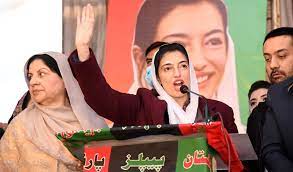
Hassan Naqvi
Let me recall the moment when Aseefa Bhutto Zardari delivered her maiden speech at the Pakistan Democratic Movement’s (PDM) rally in Multan on November 30, 2020. I was the first one to write about yet another Bhutto rising from Multan to lead the way in Pakistan’s chequered politics, fraught with pitfalls at every step. My prediction proved true as Aseefa entered parliamentary politics after being elected unopposed as MNA from NA-207 Shaheed Benazirabad on March 29, 2024.

Aseefa, the youngest daughter of the martyred Mohtarma Benazir Bhutto, affectionately described as ‘dynamite’ by her, possesses all the qualities that made her mother a great leader.
As a youngster, she became a Pakistani health activist, jumping into the fray as the UN Ambassador for polio eradication in the country, where the crippling disease was dreaded by all parents.
It was indeed one of the most eventful days when Prime Minister of Pakistan Mohtarma Benazir Bhutto held an open kutchery to administer polio drops into the mouth of tiny Aseefa, ensuring her safety from the devastating effects of the crippling disease afflicting hundreds and thousands of uncared-for children in Pakistan, mostly lacking resources for treatment or knowledge of it beyond their means.
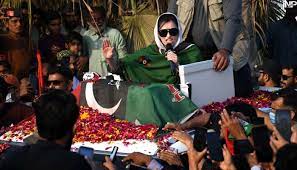
She was the first baby in Pakistan to receive the polio vaccine after her mother initiated a significant immunization drive in 1994.Multan’s historic significance is much more than that.
It was here that Bhutto Sahib addressed the select gathering of Pakistani scientists, telling them, “We shall eat grass, if need be,” to provide them funds to make a nuclear bomb. Benazir Bhutto’s was a crusade against heavy odds—on one hand opposed by the bigoted mullas who carried out a concerted campaign opposing it, misinforming the masses from the pulpit that polio drops would, in fact, render children castrated and helpless in procreation when they grow up.
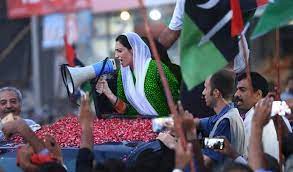
For them, it was an American conspiracy to scuttle the growth of the Muslim population. Besides, the mullas were the major hurdle in the way of eradicating polio and organizing family planning to save the country from famine and starvation.
Of course, in this whole scheme of things to eradicate polio and control the population, illiteracy has been the national curse.Like her ‘dearest mother’, Aseefa Bhutto too had ingrained qualities of leadership in her.
Shaheed Zulfikar Ali Bhutto had favored Benazir Bhutto over the boys to have a role in politics when he took her to Simla in 1972, where he signed the Simla Agreement with Prime Minister Indira Gandhi, ensuring peace in the Indo-Pakistan region covering nearly a period of around half a century.
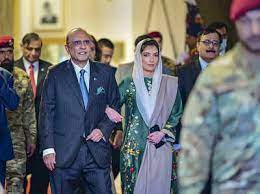
Little Aseefa too had been with her mother in 1993 when she, along with Asif Zardari, visited the United States on a crucial mission to Washington to convince Congress to give up the draconian idea of imposing sanctions on Pakistan’s nuclear program.
Benazir Bhutto saved Prime Minister Nawaz Sharif from being pilloried by the American administration to save Pakistan from being punished and strangled by Washington.
It was she who pulled ‘the Pakistani chestnuts out of fire,’ as described by India Today. In 2018, it was expected that she could possibly enter politics, but it proved to be just a rumor.
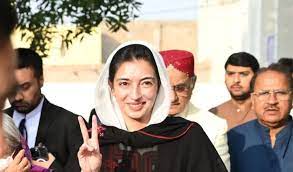
It was only in 2009 when she, for the first time, made a maiden speech.She assumed the role of a social activist and became a UN Polio Ambassador. She is also likewise a Rotary Ambassador who isn’t associated with politics yet keeps giving her views through her social media accounts.
Ever since her elder brother Bilawal Bhutto Zardari assumed the Chairmanship of Pakistan Peoples Party, Aseefa and her middle sister Bakhtawar, who happily got married to Mahmood, stood by her brother, always with him as pillars of support to keep alighted Benazir Bhutto’s political legacy for the service of the people and the welfare of the masses.
She holds a degree of Masters in Global Health obtained from the University College London. Her graduation ceremony held in London was attended by many, including her father, her aunt Sanam Bhutto, Bilawal Bhutto, sister Bakhtawar, and uncle Wajid Shamsul Hasan, former Pakistani High Commissioner to London. Aseefa was born on February 3, 1993, in London.
One day, while talking to me on the phone, Uncle Wajid recalled that on that day, Bibi rang him at Karachi Press Club to ask him to provide her views on the future course of events. Bibi was under pressure from the senior leadership of her party to join hands with the then President Ghulam Ishaq Khan.
She asked Uncle Wajid to consult their political guru I.A. Rehman. Uncle Wajid apprised me that their views were contrary to the views of the senior PPP leaders. As they believed that President Ghulam Ishaq Khan was the kingpin in the hands of the powers that be.
They believed that it would always be easier to challenge Prime Minister Nawaz Sharif since they had street power, while President Ghulam Ishaq Khan himself was a pillar of the civil-military bureaucracy and would not care for popular support.
No doubt, she was born with a silver spoon, but politics was in her blood since she was a scion of the most prominent political family of Pakistan. From her grandfather, grandmother, and mother’s side, she has the bluest of political blood. Her late mother Benazir Bhutto served as the first female Muslim Prime Minister of Pakistan twice.
Notwithstanding the horrendous tragedy of her mother’s assassination in December 2007 and her own experience as one of the three Bhutto children who used to hang onto Bibi to accompany her to jail, prison, or court—to attend to her father’s incarceration for nearly 12 years under Prime Minister Nawaz Sharif or President General Pervez Musharraf.
Only the other day, a firebrand Aseefa defied a cordon of 30 cops when they were shifting Zardari Sahib to jail from the hospital. In the midst of the hullabaloo created by the cops, Aseefa somehow managed to grab hold of her father’s hand when he was being wheeled to jail.
In the background, when one hears former premier Imran Khan lament a great deal about his 22 years in jail-free politics, masquerading as a leader who suffered a lot at the hands of the government of the day when he did not. As a matter of fact, Imran Khan would always be recalled as the defender of Musharraf’s government who helped in securing the referendum.
UNCLE WAJID ONCE REMARKED, “FOR ME, WHO HAD SEEN ASEEFA GROW FROM A TINY TOT TO A FULL-GROWN MATURE WOMAN, MAKING SENSIBLE DECISIONS, IMMACULATE IN HER CONDUCT, AND INSPIRING PPP WORKERS TO RISE TO NEWER HEIGHTS OF SOCIO-ECONOMIC AND POLITICAL COMMITMENT TO DEFY DICTATORSHIP LIKE HER GRANDFATHER, GRANDMOTHER, AND ILLUSTRIOUS MOTHER.”
Aseefa Bhutto Zardari’s entry into parliamentary politics shall remain a landmark event. Perhaps that is the reason for the growing panic in the opposing parties. One must remember that before Bilawal took a formal plunge into Pakistani politics, President Asif Ali Zardari had repeatedly talked about his son’s involvement in politics and Aseefa Bhutto’s leadership potential.
It may be mentioned that Aseefa has been assisting the Party chairman where needed. She perfectly and fearlessly led the party campaign with her brother before the 2024 elections.
To sum it up—like father, like grandfather, like grandmother, like mother—Aseefa Bhutto Zardari is the leader who shall, Inshallah, occupy the central stage in Pakistan’s politics for years to come.





